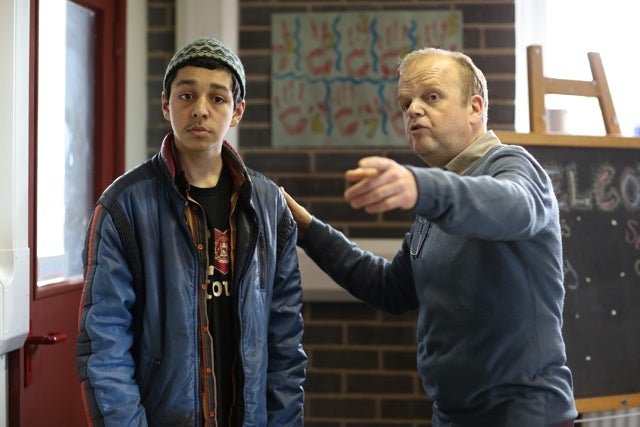Leave to Remain: Teenage asylum seekers star alongside Toby Jones in film about refugees
The film, with a score by Mercury Prize-winning band Alt-J, is based on the real stories of child refugees in Britain collected by Bruce Goodison

A Bafta-winning filmmaker is to tackle the little-known issue of teenage asylum seekers who arrive in Britain alone in a new film with real refugees playing leading roles and working on the crew.
Leave to Remain stars Toby Jones, who was recently named best actor at the Evening Standard Film Awards, alongside first timers including Massieh Zarrien who came to the UK from Afghanistan when he was eight-years-old. It emerged today that the film, which is in post production, will be scored by last year’s Mercury Award winning band Alt-J.
Bruce Goodison, who won a TV Bafta this year for Our War, has just finished filming Leave to Remain which is based on the real experiences of young asylum seekers he met after becoming involved with a community centre.
“Asylum is always a bit of a dirty word in the UK,” Mr Goodison said. “I stumbled into this story that teenagers and children arrive in the UK without their parents and have to build a life for themselves with little support. My mind did backflips and I thought: ‘How can they do this’.”
The director started supporting young people seeking asylum, going to home office and legal hearings. He also set up a film academy to train asylum seekers in different skills in the industry.
So far over 150 young people have graduated from the scheme. He also ran an open casting for the lead roles and whittled down a core group from 60 potential actors.
Massieh, who plays 15-year-old Abdul, said the experience of working on the film was “amazing” and film was something he would like to pursue as a career. He said said that while he was like his character “he doesn’t speak too much, while I blab the whole time.”
While he was too young to remember the hardship before coming to the UK, he drew on the stories of others in London’s Afghan community. “With some of the people, I know their stories. I could feel them when playing the part. It can be hard to relate to a script, but when you know it has actually happened to people you can really get in their shoes.”
Massieh used stories from people he knew to help improvise during scenes in the film. “I can feel their emotions very deeply. It is an emotional topic for them to open up about. I know a couple of stories but none as tragic as the one in the film.”

Watch Apple TV+ free for 7 day
New subscribers only. £9.99/mo. after free trial. Plan auto-renews until cancelled.
ADVERTISEMENT. If you sign up to this service we will earn commission. This revenue helps to fund journalism across The Independent.

Watch Apple TV+ free for 7 day
New subscribers only. £9.99/mo. after free trial. Plan auto-renews until cancelled.
ADVERTISEMENT. If you sign up to this service we will earn commission. This revenue helps to fund journalism across The Independent.
The young people who had escaped troubled backgrounds, told him their tales and he used several as the basis for the fictional film. Mr Goodison said a “documentary rigour” sat at the heart of Leave to Remain.
One girl from Guinea was circumcised at the age of 12, married a year later and pregnant at 14. Her husband beat her up in the eighth month of her pregnancy and she subsequently suffered a stillbirth and internal injuries from a botched caesarean due to the lack of trained surgeons in her village.
An initial attempt to escape her husband failed, and she was raped by him and his friends before she could finally escape to the UK. Her asylum appeal, however, was refused. “They didn’t believe her story,” Mr Goodison said.
Many teen asylum seekers arrive from Afghanistan. Among the boys Mr Goodison came into contact with were those who self-harmed in groups, and one who tried to commit suicide and was section.
The harrowing stories of children escaping abuse and war at home only to be met with what Goodison described as a “Kafka-esque” processing system in the UK. He pointed to a case of twins where only one received leave to remain.
He said: “It is nothing short of miraculous when these children survive and remain sane. But far from being victims of an uncaring system, having battled to be here, they don’t give up and also feel compelled to support the country that becomes their home.”
The film, which has been three years in the making, follows three teenagers forced to leave their families and homes. The stories are based on real stories told to Goodison by asylum speakers.
Mr Goodison had worked with Jones on the series 10 Days to War. “He didn’t take any persuading.”
The £500,000 budget was raised with the support of the Oak Foundation, the Paul Hamlyn Foundation and a private investor.
This year, Goodison shot My Murder, a drama about the real life “honeytrap” killing of Shakilus Townsend, for BBC.
Join our commenting forum
Join thought-provoking conversations, follow other Independent readers and see their replies
Comments